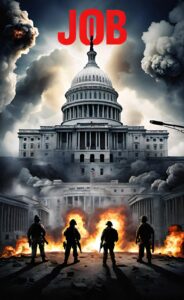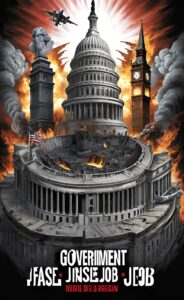In a realm where power and control often drive agendas, the line between truth and fabrication can often blur. This is especially true in the realm of government operations, where misinformation and misdirection can become strategic tools.
What are False Flags and Inside Jobs?
False Flags and Inside Jobs are secretive operations that are typically orchestrated by governments or large corporations. The intention behind these covert activities is to create a deceptive narrative that places the blame on different entities. The term ‘False Flag’ originated from an ancient naval tactic where a ship would display a flag of a different country to mislead others.
In the modern context, this refers to a covert operation designed to deceive in such a way that the activities appear as though they were carried out by another entity. Similarly, ‘Inside Jobs’ are illegal actions that are facilitated and carried out by individuals from within the organization or government itself. These operations are not officially authorized but are made possible due to the individual’s privileged position in the organization. Although these activities are illegal, they are often disguised under layers of secrecy and misinformation to serve a larger strategic objective.
Historical Overview of Government Staged Events
When it comes to examining the history of government-staged incidents, a few instances stand out. In 1933, the Reichstag Fire took place in Germany where a substantial building was deliberately set on fire. This event offered Adolf Hitler an opportunity to suspend civil rights, providing him a path to solidify his grip on power. Moving over to America, we can find Operation Northwoods, a plan proposed by the U.S. Department of Defense.
The operation involved staging acts of terrorism and pinning the blame on Cuba as a pretext to launch a military intervention. This peek into history reveals that the strategic staging of events is not new but has been a tactic used by governments in different parts of the world. It is crucial to remember these instances not as isolated incidents, but as part of a broader pattern of covert operations that have shaped the trajectory of nations.
Motives Behind Staging Such Events
The orchestration of government-staged events is typically rooted in strategic objectives. Some motives may include setting the stage for policy changes that would be controversial under normal circumstances. They may also be utilized to rally public backing for military invasions or conflicts, essentially manipulating the masses into supporting actions they may otherwise oppose.
Other times, these events can be employed to quell opposition or dissent, particularly when it threatens the status quo or those in power. A more insidious use could be to distract the public’s attention away from pressing issues that could provoke criticism or require tough decisions. Often, these deceptive operations are designed to instill fear, prompting an upsurge of nationalist sentiments.
This wave of patriotism can pave the way for governments to push forward laws or initiatives that the public might usually resist or debate. Essentially, the objective behind these operations hinges on creating a narrative that serves a greater, often hidden, agenda. The diverse range of these motives underscores the complexity of such operations and the lengths to which entities might go to achieve their objectives.
Impact on the Public and Freedom
The repercussions of government-staged events can significantly influence public perceptions and the exercise of personal freedoms. Fear is a powerful motivator, and these events often stir up a culture of apprehension and anxiety. The result is an increased acceptance of intrusive surveillance measures, justified under the guise of national security. Gradually, civil liberties may be chipped away, as people might willingly accept more restrictive policies if they believe these measures will ensure their safety.
The impact of these covert operations can ripple through generations, molding a society that is increasingly tolerant of authoritative control, all in the name of perceived security. A potent example of this is the aftermath of the 9/11 attacks, which saw a rise in extensive surveillance programs and sparked the War on Terror. Decoding the deception and understanding the true implications of these staged events can empower the public to make informed decisions and protect their rights in the face of such manipulations.



Uncovering the Evidence and Exposing the Lies
Cracking the code of deception inherent in these operations is a task of Herculean proportions due to their clandestine nature. Nonetheless, relentless investigative journalism, disclosures by whistleblowers, and persistent public demands for transparency can sometimes bring the underlying truth to the surface. The unmasking of Operation Northwoods is a shining example of such endeavors.
A vital component of this process is approaching these probes with a well-balanced skepticism, twinned with a relentless drive to corroborate facts. The objective is to resist the seductive pull of conspiracy theories, while also being cautious of taking the official narrative at face value. The process of unearthing these covert operations is painstaking, often fraught with resistance and obfuscation.
It involves analyzing discrepancies, questioning inconsistencies, and persistently seeking answers, regardless of how elusive they may initially appear. It requires the relentless pursuit of truth, unwavering in the face of setbacks or opposition. It’s a testament to the power of public vigilance and the unwavering spirit of truth seekers. In this way, the twisted fabrications can be unraveled, illuminating the realities concealed within these intricate webs of deception.
The Need for Public Vigilance
In an era where mainstream disinformation can easily skew perceptions, public vigilance serves as a crucial countermeasure. This not only involves being aware of the existence of deceptive tactics such as false flags and inside jobs but also extends to the scrutiny of official narratives. A healthy dose of skepticism can prevent the blind acceptance of stories that seem too neatly packaged or overtly manipulative. The power lies in the hands of an informed public, serving as a formidable bulwark against potential governmental overreaches.
Such critical awareness can also foster a robust democratic society, promoting the free flow of ideas and questioning of authority. Encouraging a public culture that values truth-seeking and transparency not only illuminates the darker corners of covert operations but also upholds the tenets of an open and free society. It is through the lens of vigilance that the public can discern the truth, reject manipulation, and protect their civil liberties. In the end, public vigilance represents a potent weapon in the arsenal of democracy, empowering citizens to demand accountability and preserve the integrity of their society.






